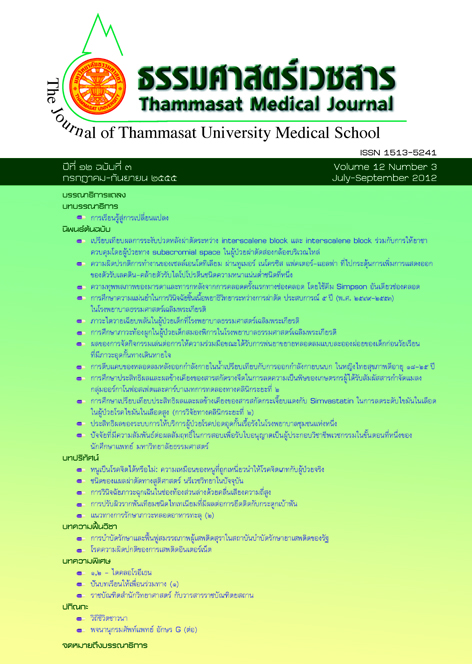Study on the Effi cacy and Side Effects of Thunbergia laurifolia Lindl. Extract on Reducing Chemical Toxicity among Agricultural Workers Receiving Organophosphate and Carbamate Insecticide Poisoning (Clinical Trial Phase II)
Keywords:
รางจืด, โคลีนเอสเตอเรส, สารกำจัดแมลง, การทดลองทางคลินิกระยะที่ 2, Thunbergia laurifolia Lindl., Cholinesterase, Insecticide, Clinical trial phase IIAbstract
Background: Rang Chuet (Thunbergia laurifolia Lindl.), a Thai herbal medicine plant, has the pharmacological effect according with Thai traditional medicine property used as an antidote for insecticide and many toxic substances, including safety for consumption in normal human. This reseasch aimed to study the efficacy and side effects of Thunbergia laurifolia Lindl. extract (TLE) on reducing chemical toxicity among agricultural workers receiving organophosphate and carbamate insecticide poisoning.
Method: This research design was a randomized, double-blind, placebo-controlled trial in 60 volunteers, having risky and unsafe cholinesterase levels tested by reactive paper and living at Wang Nam Yen District, Sa Kaeo Province. The sample was randomly assigned to 2 groups, 30 volunteers for each group. Experimental group received TLE 2 capsules (300 mg a capsule) once a day after meal for 2 weeks orally while controlled group received placebo. History taking, physical examination and laboratory tests were performed before, during administration at 1 and 2 weeks, and after fi nishing administration for 2 weeks.The laboratory results were compared with repeated measure ANOVA analysis for level of significance at p<0.05.
Result: In the group receiving TLE, serum cholinesterase was signifi cantly increased at the fi rst week whereas acetyl cholinesterase was signifi cantly decreased at the first and second weeks comparing with the baseline; however, they were not signifi cantly different comparing with the placebo group. Blood sugar, liver function test, renal function test and hematological values of both groups had some alteration but still within normal range. Furthermore, there were no serious side effects of TLE.
Conclusion: The oral administration of TLE at the dose of 600 mg a day for 2 weeks continuously had no different efficacy on reducing organophosphate and carbamate insecticide poisoning comparing with placebo, and did not cause side effects.
Key words: Thunbergia laurifolia Lindl., Cholinesterase, Insecticide, Clinical trial phase II



